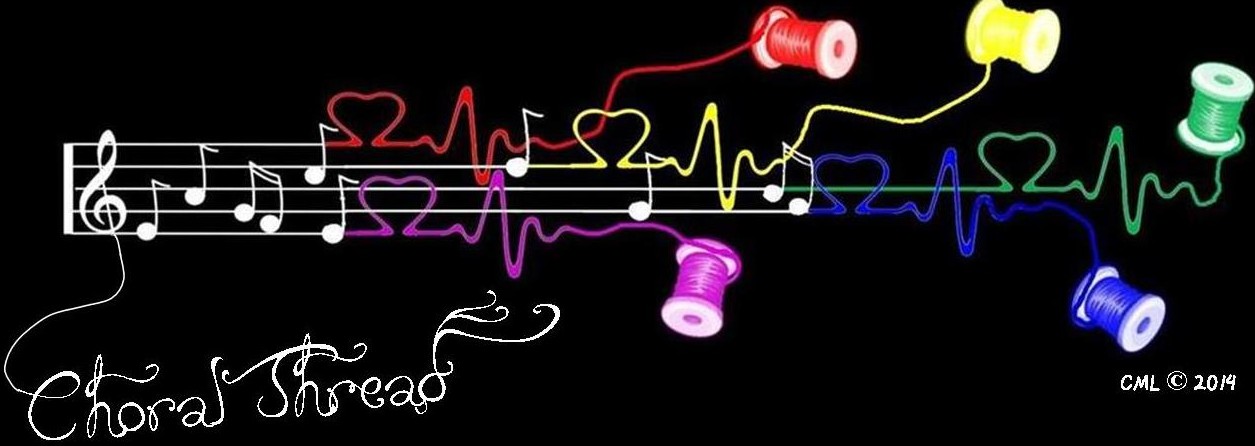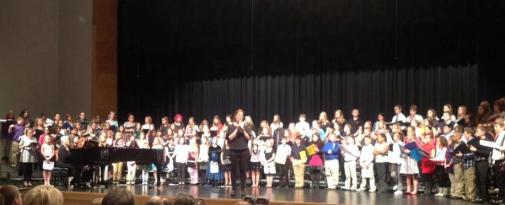This past weekend it took the simple act of attending what I assumed would be just an ordinary district elementary honor choir concert to remind me of a deeper level of artistry and beauty in this world that I had completely forgotten about.
As I was casually sipping my morning tea and having breakfast with a friend of mine, she suddenly suggested that we could show our support to a mutual friend’s daughter who was going to be singing in the district elementary honor choir concert that afternoon under the baton of a guest clinician. I immediately said yes because this daughter of our friend is very intelligent, creative, well mannered, and deserving of encouragement and support. However, I simultaneously dismissed the possibility of enjoying the music on an artistic or soulfully moving level. It wasn’t that I didn’t think the choir could have a few moments of beautiful sound and musical expression; for several reasons, I just didn’t think I would find the concert particularly meaningful – spiritually or artistically. First of all, sometimes the texts in music literature selected for children’s choirs tend to be “fluffy” or geared toward their interests, for example, Disney arrangements. Next, the possibilities and availability of musical repertoire for children’s choirs can seem very limited because it has some natural confines such as a child’s tessitura. Furthermore, because children learn to sing through imitation and, sadly, most of the examples they are constantly bombarded with are pop artists from television and radio, they learn to sing with a forced tone that can be sharp or fall flat. It takes a very special teacher/conductor working consistently and tirelessly to correct them of that bad habit while at the same time keeping them interested, making it fun, and getting them to appreciate why they are working so hard at it. My final thought was that while I’m thankful that children’s choir directors are facilitating a child’s introduction to choir, I know they are limited by the artistic challenges with which they can present the choir. But the concert I experienced made me take a deep breath and examine myself again.
I have always tried my best to make a point of admitting when I am in the wrong or haven’t given someone (or some group) the benefit of the doubt. So let me begin by saying how ashamed I was at myself this weekend when I realized that I had become such an artistic snob. When I went to graduate school to get my master’s degree in Choral Conducting, I wanted to get into the best program, work with the best conductors, and study the most challenging and difficult choral works – all so that I could eventually conduct a choir that would be considered one of the best in academia. That is exactly the training I received. Unfortunately, somewhere along the way I lost focus on the human element of choral music. I got so wrapped up in technique that I lost touch with how some of the best choral artistry is created – which is through the very souls that produce it. James Jordan in his book The Musician’s Soul says that “soulful human beings create profound music, regardless of their level of musical achievement.” How could I have ever lost that! Especially since choir is where I discovered more about myself and my place in the world. Simultaneously, I learned from those early experiences that a conductor doesn’t simply conduct; his role is also to bring new meaning to each person in the choir while helping each one reflect some part of his or her soul or life experiences into the songs they are performing. Looking back now on the district elementary honor choir concert, I have to ask how I could have doubted that this concert would be any less artistic or meaningful than any other.
The beautiful children in the district elementary honor choir did, in fact, create great art, and it was obvious from the very first selection in the program, Ajuba, a spirited and rhythmic Swahili greeting call. I listened and watched while they took ownership of it. They came alive both physically and vocally. I was very pleased with their pronunciation and diction because that is most often the first thing to go in a performance if a choir doesn’t really understand or believe in the text they are singing. And while the diction wasn’t perfect, it was obvious that they not only understood what they were singing about, but that they were also able to relate it to their own lives. Although it would have been very easy for them to have rushed the tempo because of the syncopation and rhythmic style, they did a very good job of holding it back, no doubt the result of excellent guidance and encouragement from the clinician Mrs. Stella Hastings. As she took a moment to speak to the audience about the song, their big grins mirrored her delight in their achievement.
However, the artistry these kids demonstrated wasn’t limited just to singing; it was also demonstrated in the sacred birth that all artists hold dear – an original creative work. A contest was held for students in the choir to submit poems, with the winning poem to be featured in a choral composition commissioned specifically for the honor choir. The poem selected, “The Musical House” by Corin Cooper, describes a home where music is pursued, encouraged, and nurtured. The composer, Earlene Rentz, says of Corin’s poem: “When I read her words, I felt as if I were on a musical safari in her home. I could almost see it. In other words, she took me there.” I myself found the text to be unique, charming, very insightful for a poet of her age, and extremely adorable! And I can easily see why Rentz selected Corin’s poem; it inspired her to create music that is fun, peppy, memorable, and would appeal to audiences of any age. Now while only that one poem was selected for the composition, the competition offered a rare opportunity for artistic involvement that hopefully sparked the creative imaginations of those children for a lifetime of other possibilities. That level of artistic involvement needs to be provided more often by teachers, conductors, and other arts leaders.
Furthermore, I had forgotten how beautiful and moving simplicity in music can be. Way too often I have found myself thinking that the more challenging the choral repertoire is, the more artistic merit it has and the more likely it is to spiritually move the choir, the audience, and myself. When I come across a new and unique choral composition that has thick, challenging harmonies, textures, and rhythms, I think, “Wow! Now that will really grab an audience’s attention.” However, during this concert I found myself hearing beautiful musical moments in some of the simplest parts of the music. For example, there were many moments when the choir would sing a unison phrase with beautiful tone quality, blended vowels, and demonstrated artistic sensitivity to volume. Ironically, each time the children’s honor choir had those beautiful phrases, I recalled experiences when even some of the older, more seasoned choirs I’ve worked with became lazy when singing in unison because they had the misguided notion that good tone quality is easier to maintain during those types of phrases. While the children’s performance wasn’t perfect and yes one could have made a list of things for them to improve on, what’s more important to point out, is that they were really enjoying listening to one another as a group and loving what they were accomplishing. They knew they had to continue to work hard throughout the concert to keep the level of artistry they had achieved as a result of the many hours of rehearsal they had given. When a choir works together like that, it is a good sign that they are experiencing a meaningful (and possibly spiritually moving) moment together. Shouldn’t that be just as important as getting the “ideal choral sound!”
I really did want to kick myself at the end of the concert for having been so dismissive about the artistic capabilities of a children’s choir. This may be an over-generalization, but I think choral conducting pedagogy currently focuses way too much on technique and not enough on the connection of humanity and personal experiences that choral music can create. Because of the over-emphasis on technique, I believe conductors put so much pressure on themselves to get the perfect sound that they forget that artistic quality is in the eye of the beholder. I also believe that the majority of singers come into rehearsals with so many other things on their minds from the busyness of the day, that even before the rehearsal has begun they have closed themselves off to experiencing any soulful or meaningful opportunity that may present itself. They come, convinced that the rehearsal will focus only on learning the notes or fixing techniques. But what if we are all shortchanging ourselves? Perhaps if we begin each rehearsal in a way that permits us to open up to soulful and meaningful moments, it will allow everyone to fully commit to the music at hand. That could very well mean that we start rehearsals unashamedly acknowledging that mistakes will be made during rehearsals (yes, even the conductor) and that’s okay. Why shouldn’t mistakes be meaningful and soulful in their own right? After all isn’t that one of the ways we learn? If we take away that fear of being vulnerable because of our mistakes, will that finally allow the singers’ inner ears to relax and identify what needs fixing before the conductor even mentions it? Think of how fast rehearsals might go and how much more we could accomplish. We all, conductors and singers alike, need to be less afraid of being vulnerable. We need to be able to say, “I’m not perfect, you’re not perfect, and that’s okay.” Only when we can admit that – will we achieve true artistry!
Here is a link to the Joplin Globe article that mentions the District Elementary Honor Choir concert and the composition commissioned for the performance:

